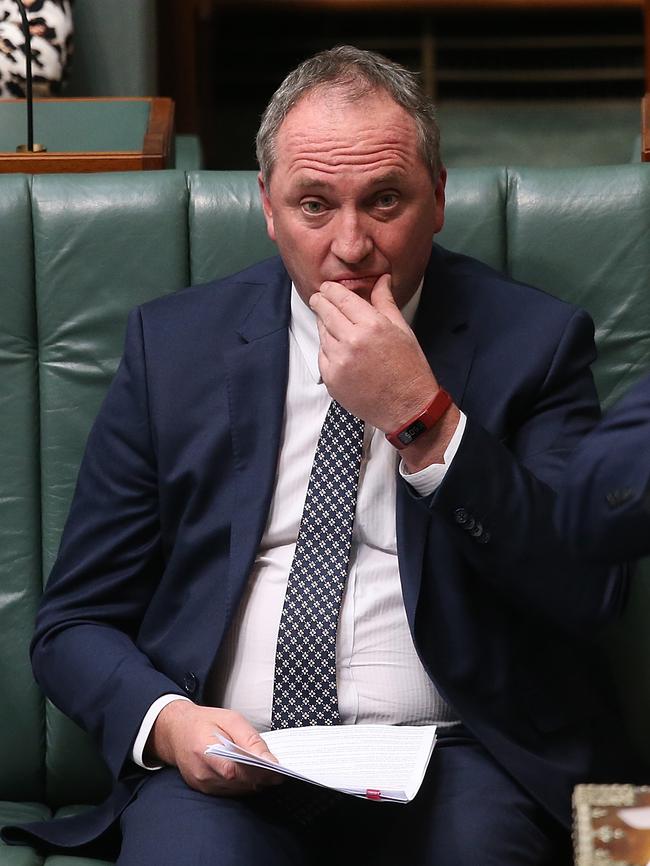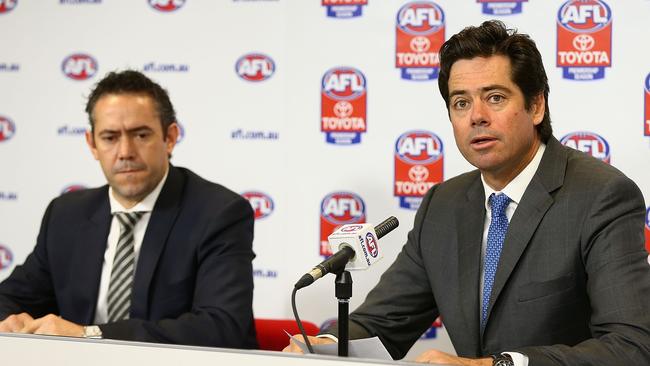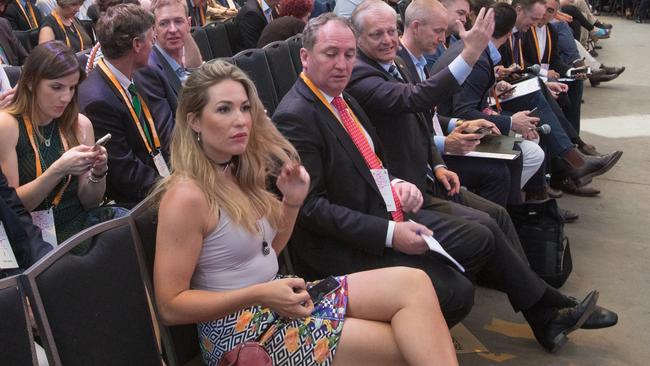Recent sex scandals have taken the romantic edge off the workplace affair
A RASH of recent workplace affairs that have blown up into national scandals have left many wondering - just what are the rules of engagement now for workplace love?
VIC News
Don't miss out on the headlines from VIC News. Followed categories will be added to My News.
HUMAN sexuality is a messy business, says social commentator Catherine Lumby.
Few of us would need to be reminded of that this week.
Barnaby Joyce’s career is teetering on destruction, the nation is fixated on the gory details — let alone on the fallout Joyce’s baby-making affair is having on his family, reputation and party — and becoming lovers at work has never looked more like a too-dangerous liaison.
COPS REMOVE PASSSENGERS AFTER CRUISE SHIP ‘BLOODBATH’
HOW TO CELEBRATE CHINESE NEW YEAR IN MELBOURNE
WHITE NIGHT MELBOURNE: YOUR COMPLETE GUIDE
It will be if you are a minister in Malcolm Turnbull’s government, after he spectacularly banned his ministers from having sex with staff.
Just ask former, high-flying AFL executives Simon Lethlean and Richard Simkiss, both of whom were made to walk last year for having extramarital affairs with more junior women in their workplace.


Or think about John Neal, the former CEO of insurance giant, QBE, who had his pay docked by a whopping $550,000 in February for delaying telling the board about his relationship with his personal assistant.
He went from the job in December.
And don’t forget the slow-motion train wreck that was last year’s Channel Seven sex scandal, the endlessly salacious story of the affair that went bad between the married network boss, Tim Worner, and gorgeous young executive assistant, Amber Harrison.
After both sides weathered months of PR poison, Harrison declared her legal gagging by Seven a textbook example of “how many ways you can screw a girl”.
Quite.

But in an era where “cheating” websites such as Ashley Madison bombard media with press releases about how married people think the school gate is a great place to flirt, just how morally, and professionally dangerous is it hook up with somebody at work?
If there are rules around workplace relationships, they have never been more difficult to define.
Yet in the #MeToo era the consequences of getting them wrong appear catastrophic.
Professor Lumby, an academic, author and gender relations commentator, says especially given so many Australians meet their life-partner at work it is impossible to outlaw consensual, adult, romantic behaviour.
This is true n matter what parliamentarians such as Cathy McGowan, who has proposed a so-called “bonk ban” on politicians and staff, may think.
“Flirtations happen in the workplace, you can’t legislate against that,” says Professor Lumby, gender adviser to the National Rugby League, and panellist on the Q&A #MeToo special.
However, “it’s incumbent on the more senior person to be very cautious when it comes to assuming someone is interested in them — they have to wait for the more junior person to make the approach”.
Professor Lumby highlights how complex and varied standards on sex in the workplace are across the workforce, noting that, “in a university you will be suspended if you have a relationship with a student, even if it’s a PhD student your own age”.
Doctors, too, will suffer deregistration if they cross the boundary between provider and partner with a patient.
“But in other organisations it’s way overstepping the mark to say affairs won’t happen,” Professor Lumby says.
“What matters is how they’re managed.”


Professor Lumby is among the many who suggest as long as relationships are consensual and between adults it is essentially no one else’s business what goes on after hours.
“The reality is, about half of married people in Australia have had affairs; some people have a very strong moral response to that, but there are many reasons why it happens,” she says.
“Often unhappy marriages are involved on both sides.
“I don’t think we should be in the business of bed-sniffing as long as the sex is safe, consensual and ethical — meaning care for self and for others.
“The last part rules out the potential for any exploitation of a workplace power imbalance between the parties, which, of course would be unethical.”
Dr Catherine Brown a psychologist, executive coach and web columnist takes a hardline on workplace infidelity.
In her column titled The office affair: why it’s so tempting and five reasons it’s a bad idea she cited the statistic that 36 per cent of us have had an affair with a co-worker — and warned anyone considering one should know the pitfalls.
The biggest downside is “people will find out and they will talk about it for years”.
“I am constantly amazed at how long the story of an office affair persists, long after those involved have left the workplace,” she writes.
“People don’t often get to have real life dramas roll out in front of their eyes that don’t involve them.
“They can judge you, tell stories about you and pretty much everyone is interested.”
Herald Sun Weekend psychology columnist and commentator Sandy Rea warns even when neither one in an office romance is already partnered, protocols need to be followed to avoid trouble.
Big problems can arise when one partner is of ‘lower-status’ than the other.
“Office relationships are often based on an inequity of power; there is a boss and a subordinate,” she says.
“Office power is all determined by roles, and those roles become blurred (by intimate relationships). This becomes a template for disharmony.
“Inevitably, people smell, see and feel when there is a sexual relationship going on; by virtue of that, the dynamic of any office changes.
“Barnaby Joyce’s chief of staff had to leave (Di Hallam reportedly quit Joyce’s office last December to take up a departmental role after seeking to have his now-partner, Vikki Campion, shifted).”

Rea says “the worst type of intra-office relationship” is one in which other staff have to cover for a married partner.
“This means everyone has to be sworn to a covert cone of silence, and that puts enormous stress on other employees; it is very distressing and inappropriate to ask other people to cover your lies and deceit when they meet up with the married partner.”
When sexual tension exists it is tangible to colleagues, and if one or both is married “it inevitably produces a whole range of changed behaviour”.
Issues may arise if there is any perception of favouritism, or if other staff feel affected by “covert behaviour”.
Like Professor Lumby, Rae says the person in the position of greater power has to tread extremely carefully: “The person in the position of power is the one who has to make diligent and concerted decisions about having a relationship and the consequences. They think of the lustful moments and it’s all wonderful, but what’s going to happen if it fails?”
There are inevitable consequences for staff relationships if the romance ends.
“Once you’ve had a sexual relationship with someone you can never go back to a ‘normal’ work relationship,” she says.

Monash University human resource Associate Professor, Peter Holland, says legally, the status of office romantic relationships can be a minefield.
Especially in light of issues raised by the #MeToo movement “one person’s attempt at starting a relationship can be another person’s harassment”.
As old-school as it sounds, workplace codes of conduct around relationships must be carefully observed.
“The code of conduct is the key; you tell people in the workplace when they start (there) that, ‘These are the guidelines if you have a workplace relationship; you are expected to tell your supervisor’.’’
While not wishing workplaces to take “police-state” type control of employees’ private lives, Holland says codes of conduct make people aware of their responsibilities.
“If it’s a relationship you both believe is real, talk to your respective supervisors, and also to HR,” he says.
If necessary, HR can help each navigate the workplace if they split but both want to stay.
Workplace author and psychologist Meredith Fuller says behaving transparently is the best protection for couples becoming involved at work.
“The most important thing people need is transparency of communications; most organisations have some kind of protocols, or guidelines which give some sense of what is appropriate. We all need to acquaint ourselves with what those are,” she says.
Much as pop culture may make the world look like one big, consequence-free sex festival, Fuller says “there is not less ambiguity” around extramarital affairs, and if anyone senses an affair is producing special treatment for another employee “they’re going to have a strong opinion on it”.
Still, if neither party is abusing their power or harassing the other, Professor Lumby says the office fling is still, largely, the business of the two involved: “Some HR people say it causes problems and conflicts in the workplace, and it can be a risky business,” Lumby says.
“But I’m not in the business of moralising about people’s sexual behaviour, people in glass houses shouldn’t throw stones, and I think we all live in glass houses on that.”
Originally published as Recent sex scandals have taken the romantic edge off the workplace affair


